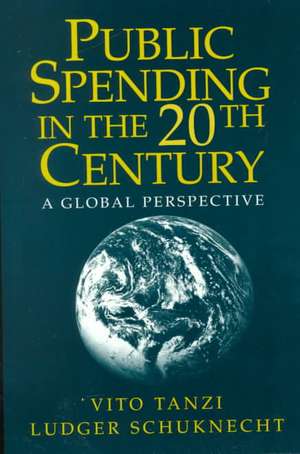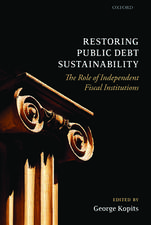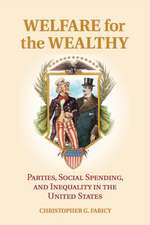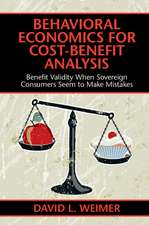Public Spending in the 20th Century: A Global Perspective
Autor Vito Tanzi, Ludger Schuknechten Limba Engleză Paperback – 4 iun 2000
| Toate formatele și edițiile | Preț | Express |
|---|---|---|
| Paperback (1) | 374.71 lei 6-8 săpt. | |
| Cambridge University Press – 4 iun 2000 | 374.71 lei 6-8 săpt. | |
| Hardback (1) | 699.45 lei 6-8 săpt. | |
| Cambridge University Press – 4 iun 2000 | 699.45 lei 6-8 săpt. |
Preț: 374.71 lei
Nou
Puncte Express: 562
Preț estimativ în valută:
71.70€ • 76.67$ • 59.78£
71.70€ • 76.67$ • 59.78£
Carte tipărită la comandă
Livrare economică 17 aprilie-01 mai
Preluare comenzi: 021 569.72.76
Specificații
ISBN-13: 9780521664103
ISBN-10: 0521664101
Pagini: 308
Ilustrații: 41 tables
Dimensiuni: 152 x 229 x 18 mm
Greutate: 0.43 kg
Ediția:New.
Editura: Cambridge University Press
Colecția Cambridge University Press
Locul publicării:New York, United States
ISBN-10: 0521664101
Pagini: 308
Ilustrații: 41 tables
Dimensiuni: 152 x 229 x 18 mm
Greutate: 0.43 kg
Ediția:New.
Editura: Cambridge University Press
Colecția Cambridge University Press
Locul publicării:New York, United States
Cuprins
Part I. The Growth of Government: A Historical Perspective: 1. The growth of government since 1870; 2. The composition of public expenditure; 3. Revenue, deficits, and public debt; Part II. Gains from the Growth of Public Expenditure: 4. Historical evidence on government performance; 5. The size of government and its performance; 6. The experience of the newly-industrialized economies; Part III. The Role of the State and Government Reform: 7. Rethinking the role of the state; 8. Fiscal rules and institutions; 9. Blueprint for public expenditure reduction; Part IV. Recent Countries' Experiences in Reforming the Government: 10. Recent reform experience; 11. Fiscal reform in the public debate; 12. The future of public spending.
Recenzii
' … a fascinating new book … Tanzi and Schuknecht argue, persuasively, that until the 1960s the rise in spending seems to have brought a big increase in public welfare, but that the extra spending mandated in the 1960s and 1970s, the age of greatest confidence in government, brought no further benefits.' Financial Times
'The authors argue that the state in most Western countries is far larger than it needs to be to achieve its economic or social objectives. Employing a simple, but logical, methodology, they make a surprisingly persuasive case that we have gained little or nothing in terms of improved economic or social (including redistributive) outcomes from the huge expansion of the state that took place after World War II. Moreover, they argue that it is not only desirable but feasible to reduce the share of the state from an average (for 17 OECD countries) of 46 percent of GDP in 1996 to something closer to the 28 percent that prevailed in the same countries in 1960. Although the arguments and conclusions of this book will no doubt be controversial, they cast important new light on the past and future of one of the most important phenomena of recent times - the growth of the state. The book should be read, and read widely.' Richard M. Bird, University of Toronto
'This excellent book documents the growth of government spending during the 20th century, its economic costs, and its disappointing failure in raising social welfare. Moreover, the authors - well-known public finance experts - argue convincingly in favor of government reduction, pointing out specific state reforms to reduce government size and raise social well-being. Although this brilliant volume is addressed to a general audience, it is rich in new statistical evidence and well grounded in modern theory. It should be mandatory reading for fiscal experts, policy makers, and the interested public at large.' Klaus Schmidt-Hebbel, Central Bank of Chile
'Widely regarded as the classic international study on the subject.' David B. Smith, Chief Economist, Williams de Broë
'The authors argue that the state in most Western countries is far larger than it needs to be to achieve its economic or social objectives. Employing a simple, but logical, methodology, they make a surprisingly persuasive case that we have gained little or nothing in terms of improved economic or social (including redistributive) outcomes from the huge expansion of the state that took place after World War II. Moreover, they argue that it is not only desirable but feasible to reduce the share of the state from an average (for 17 OECD countries) of 46 percent of GDP in 1996 to something closer to the 28 percent that prevailed in the same countries in 1960. Although the arguments and conclusions of this book will no doubt be controversial, they cast important new light on the past and future of one of the most important phenomena of recent times - the growth of the state. The book should be read, and read widely.' Richard M. Bird, University of Toronto
'This excellent book documents the growth of government spending during the 20th century, its economic costs, and its disappointing failure in raising social welfare. Moreover, the authors - well-known public finance experts - argue convincingly in favor of government reduction, pointing out specific state reforms to reduce government size and raise social well-being. Although this brilliant volume is addressed to a general audience, it is rich in new statistical evidence and well grounded in modern theory. It should be mandatory reading for fiscal experts, policy makers, and the interested public at large.' Klaus Schmidt-Hebbel, Central Bank of Chile
'Widely regarded as the classic international study on the subject.' David B. Smith, Chief Economist, Williams de Broë
Descriere
This book discusses the changing role of government finance in the twentieth century.



















